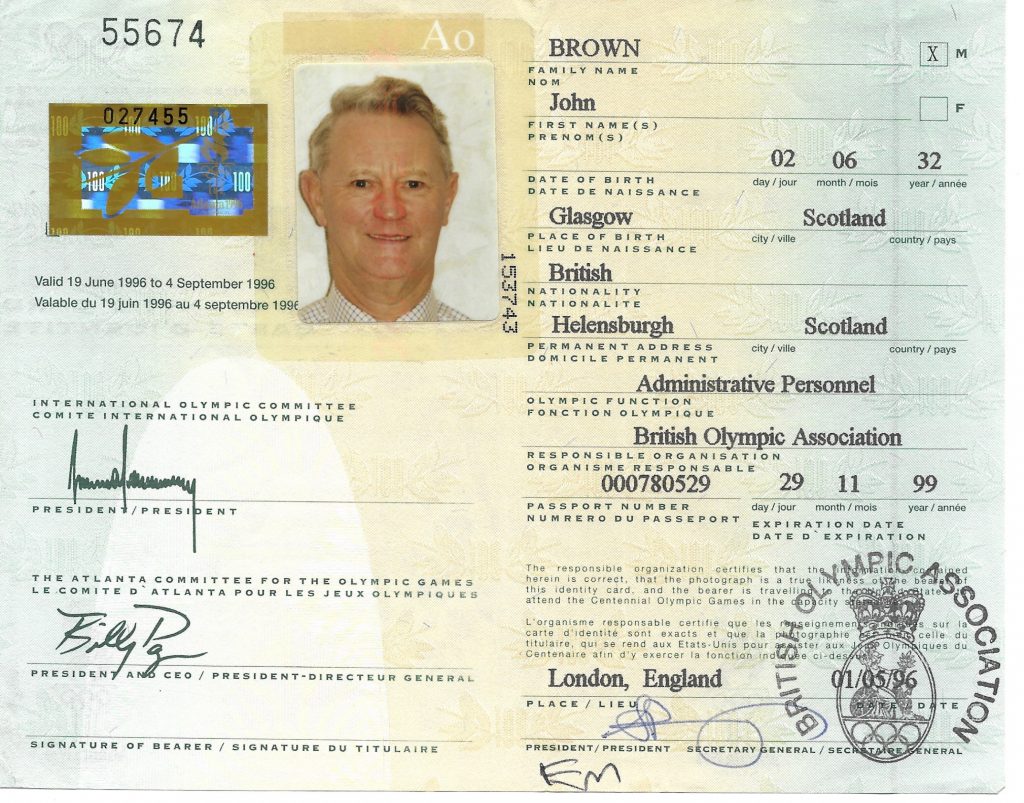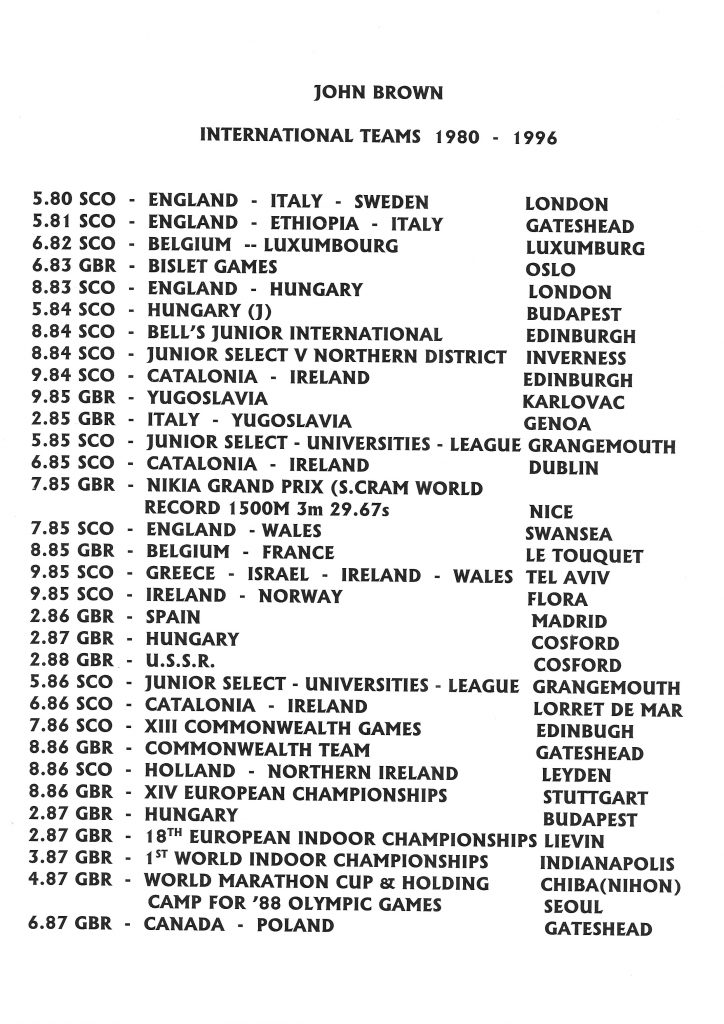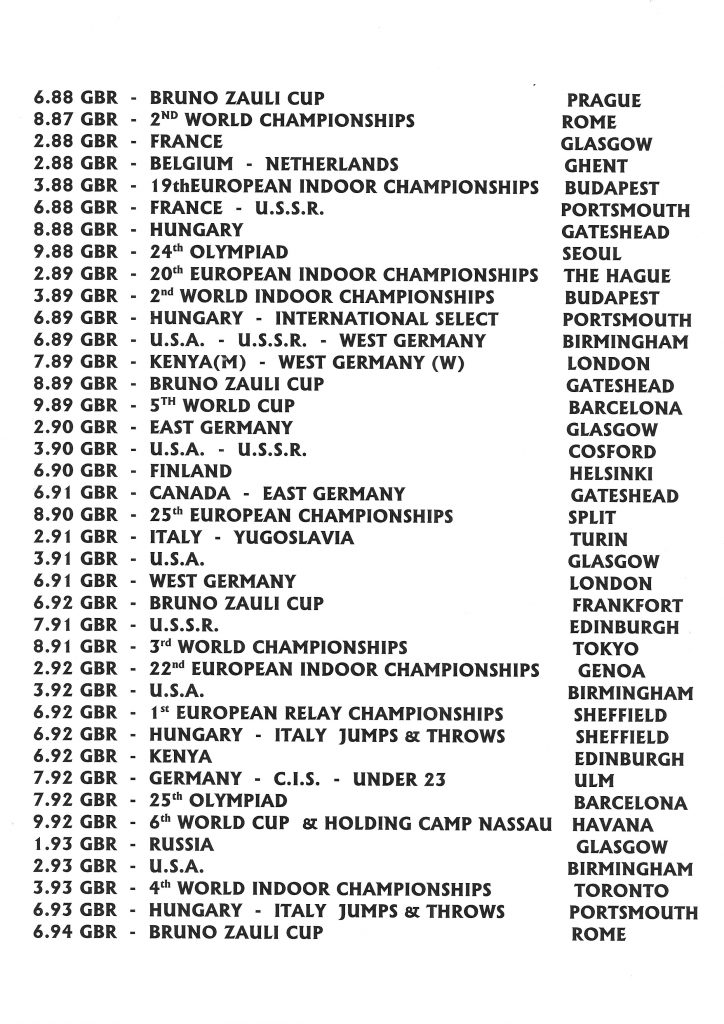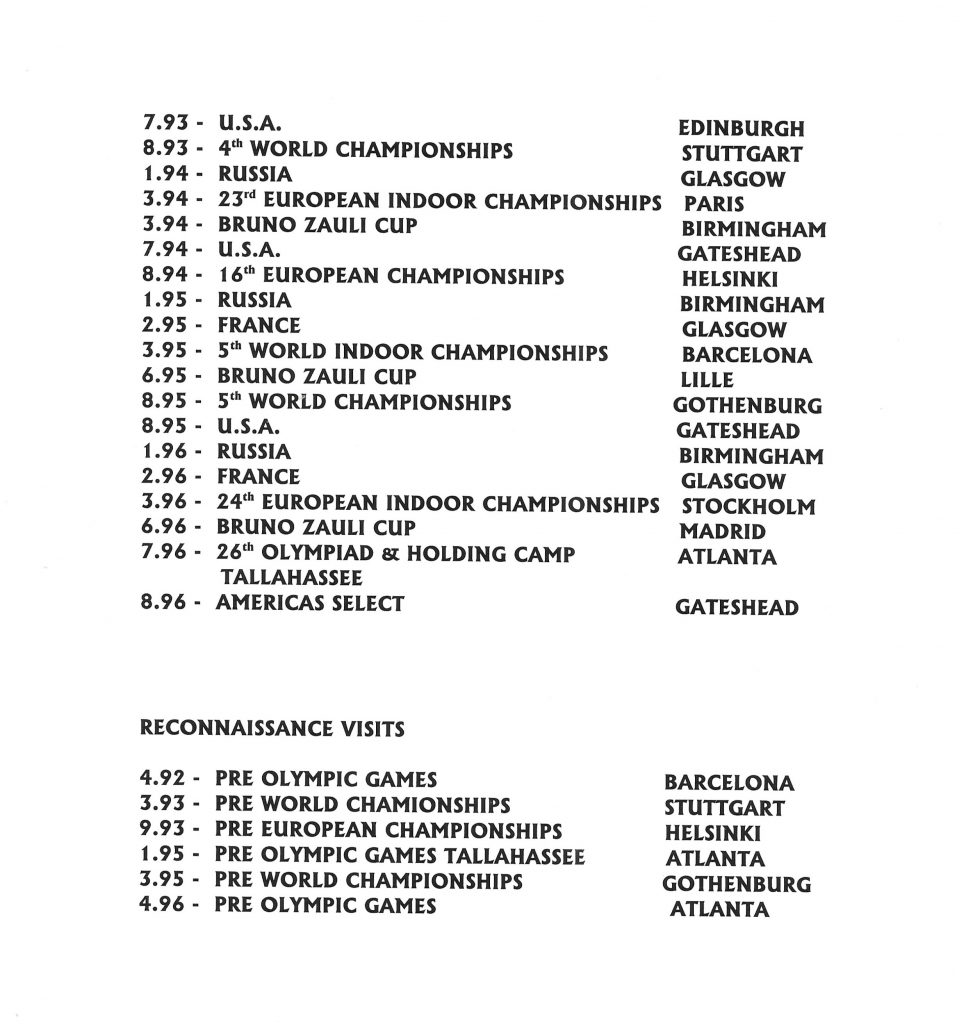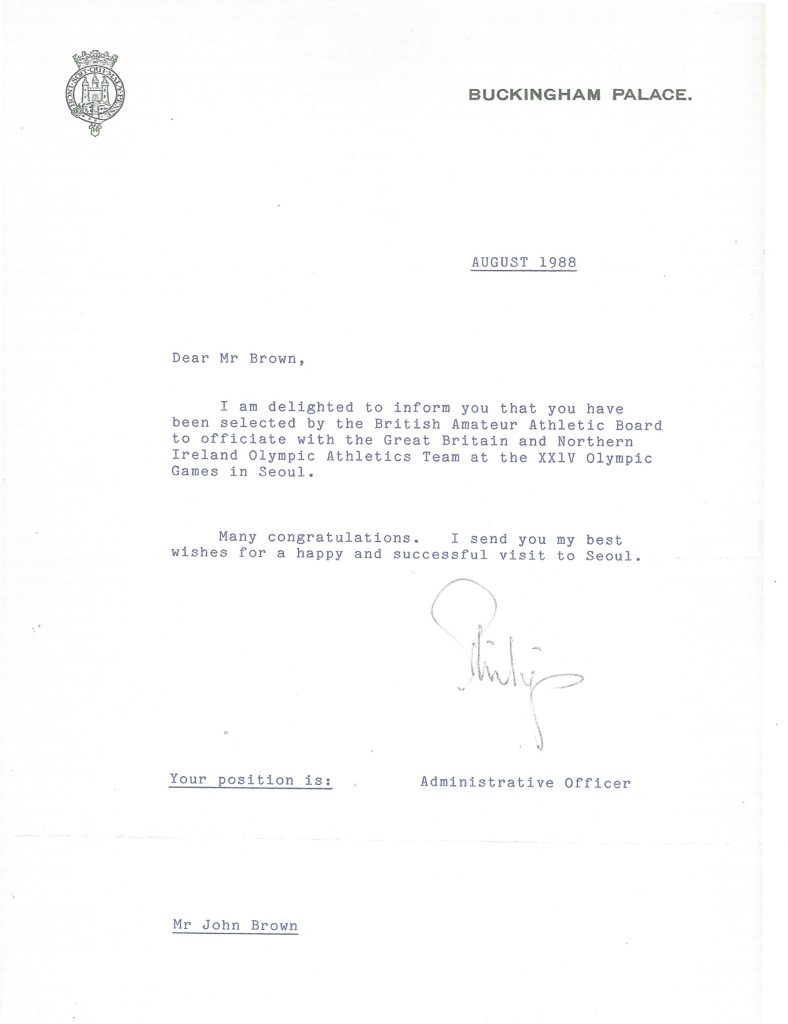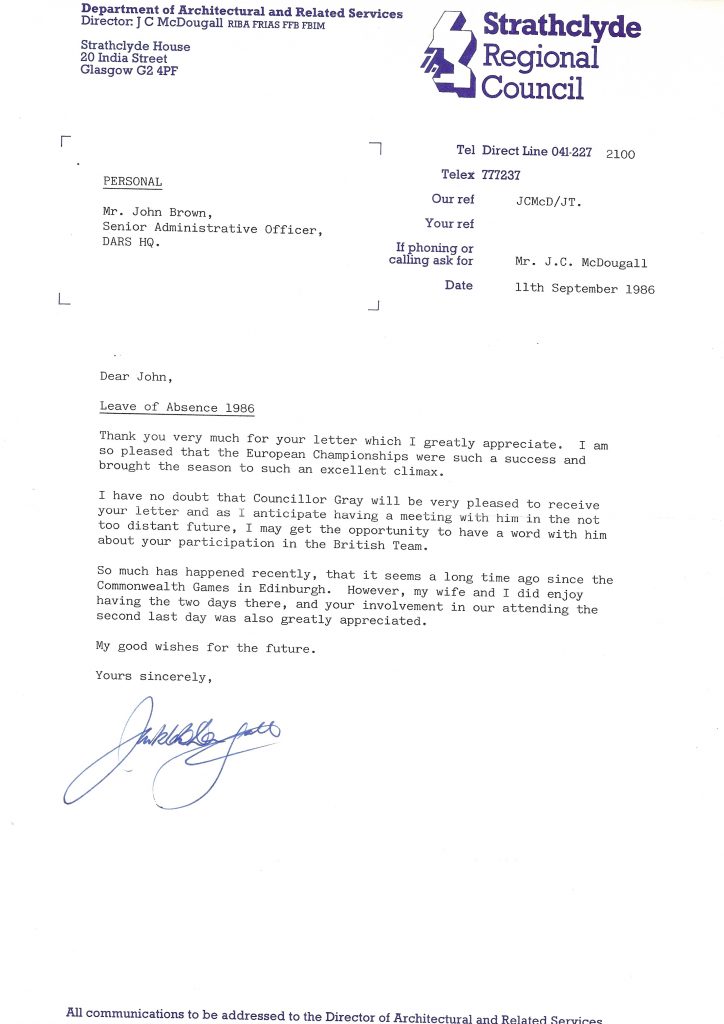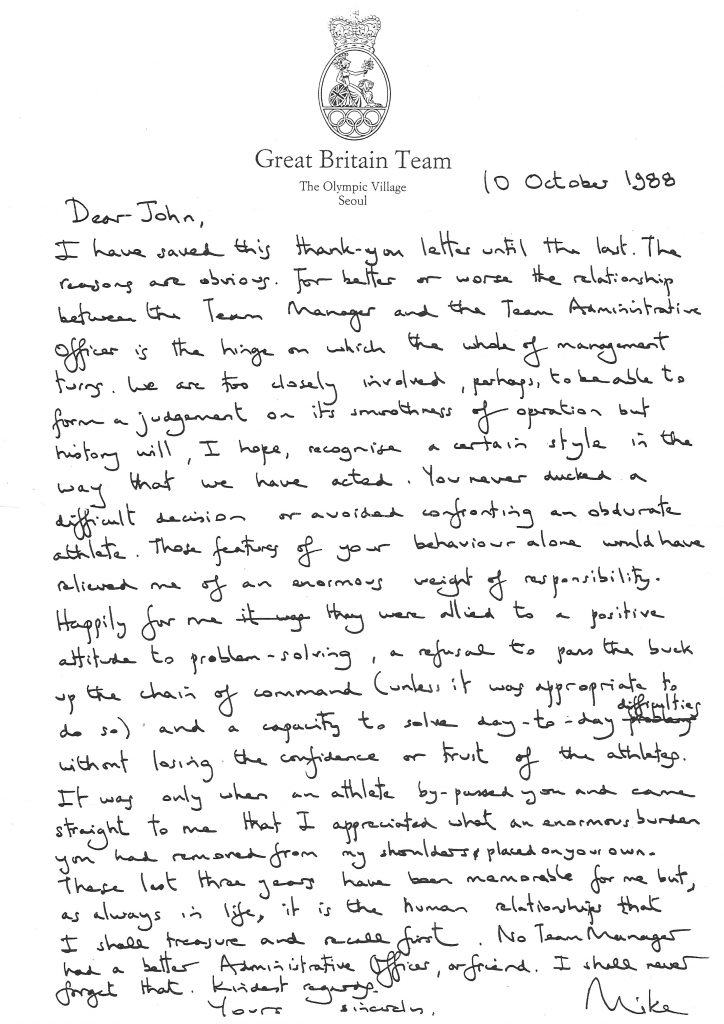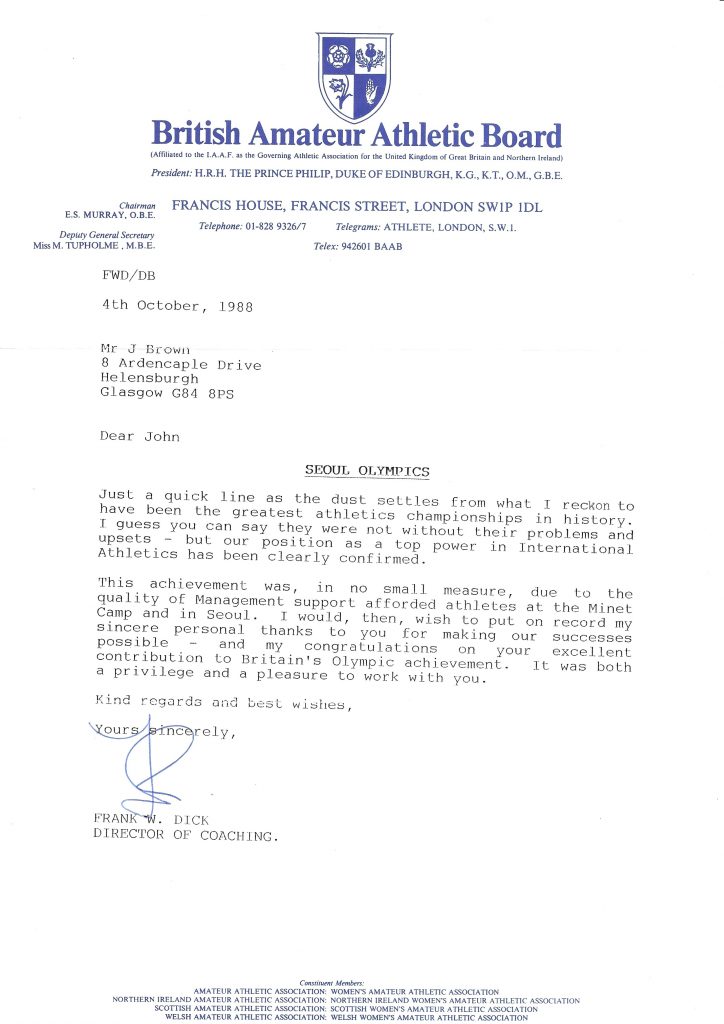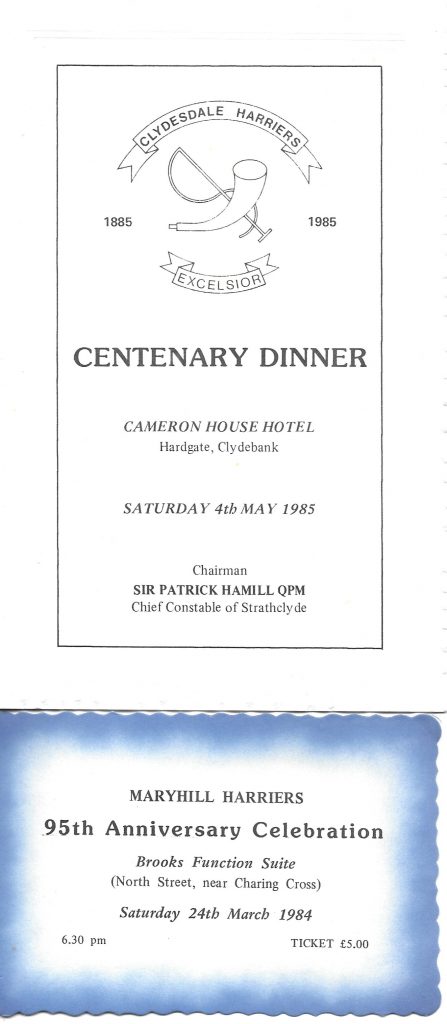This not a report on the 1988 or any other Olympics It is an account of the involvement of one of the country’s best ever administrators, John Brown and a preliminary look at what his involvement as Admin Officer meant after his selection.
John’s I.D. Card for Atlanta Olympics.
Neither the extent nor the depth of John’s work for the sport on the international stage is not known or appreciated in Scottish athletics. It is therefore to give some indication, first, of the extent of his involvement. This page has information about the first steps in the process. It is not specific to any one Games but includes items picked from all three of his Olympics to illustrate the situation in general.
– how he was informed officially about the appointment,
-steps he had to take as a result such as informing his employers,
-plus two letters from after the Games congratulating him on his performance.
The following page – Atlanta Olympics – is an example of what he had to do and some of the problems he had to deal with at Atlanta. The other Games followed a similar pattern. And finally in this section there is an indication of all the pre- Games meetings that had to be attended as well as correspondence with sponsoring firms. That’s at Lead in to an Olympics.
We have below a list of the various countries and meetings that he worked at over the period from 1980 to 1996. Comments later.
The list indicates that he has served the athletics cause in Europe, Asia, and America. He has traversed the length and breadth of Europe – in addition to all four home nations, he has been in Gothenburg, Helsinki, Stuttgart, Barcelona, Madrid, Stockholm, Lille, Paris, Rome, Ulm, Turin, Split, Budapest, the Hague, Ghent, Budapest, Leyden, Prague, Lievin, Lloret de Mar, Genoa, Karlovac, Japan, Le Touquet, Nice and Oslo. I make that 25 venues but I may have missed one. Many of them were visited more than once. In the Americas, there were Atlanta, Havana and Toronto. In Asia there have been Seoul, Chiba (Nihon) the holding camp for Seoul, and Tel Aviv. Most venues were seen more than once – eg Atlanta was visited for recce visits as well as for the Olympic Games. The Olympic Games he attended were in Seoul in 1988, Barcelona in 1992 and Atlanta in 1996, world championships were in Rome, Tokyo and Stuttgart.
There is also the issue of when does a member of the management team get told/invited that they will be involved? In the case of the Edinburgh Commonwealth Games in 1986, John had four years to prepare. Difficult enough when he knew the Scots athletes at least by reputation but many personally. How much more difficult was it for a polite and diffident Scot to deal with and understand British ‘stars’ often already Olympic medallists? The correspondence on these issues is revealing. He had been of course told a few years before that he would be invited to be admin officer for the Seoul Games and had done his homework and worked at other meetings as a lead in, but the action kicked up a gear when he received this letter.
An additional factor in his job as Admin Officer (for Team GB) or Team Manager (Scotland) was the need to get time off from his day job. It is one thing for the athletics bodies to do the selection but if he could not get the time off then there was nothing he could do about it. Like everyone else in the sport, he was an amateur. Maybe financially but in every other way – approach to the job, having the psychological tools to deal with temperamental athletes, the diplomatic knowledge and techniques to persuade providers of equipment, transport or other necessary materials – he was professional. In any case he had to seek permission to go to these events, and it helped if he could keep the line managers, politicians and locals informed of the success of the teams he had already been working with after gaining their permission. Below is the correspondence from the Commonwealth Games in 1986 as an example. They indicate how he kept them informed and how they enjoyed the sometimes reflected glory of the teams he worked with. The first ones are from 1986 and were sent to individual councillors like this one to Charles Gray from John on BAAB headed notepaper.
They all replied individually and we show this one from the ‘head of the house’ on Council headed notepaper.
Athletes often congratulate each other on their success and comment on each other’s performance. Peer approval is a big factor in any sphere of life. Running a successful athletics team is no different. The team managers, coaches, administrators, medical personnel and so on all depend on each other just as members of a relay team or field sport do. John has letters from Frank Dick, Mike Turner and others congratulating him on his performance after almost every major Games or big international meeting at the time. This is from Dr Mike Turner , Overall Team Manager.
And from Frank Dick
The letters above mention various aspects of his job as admin officer and when discussing them, we need to have a look at the athletes on the Seoul team with whom he was dealing for a large part of the time. The athletes included Liz McColgan, Elliott Bunney, Yvonne Murray, Linford Christie, John Regis, Daley Thomson, Colin Jackson, Mike McFarlane, Fatima Whitbread, Mark Rowland and other well known names throughout the team.
Mike in an earlier letter, not shown here, mentions athletes with issues about kit – not the right size, not the correct quantity, maybe an item slightly imperfect. Many athletes criticise each other as being ‘kit junkies’ who collect as much as they can get: Olympic kit must be at a premium and John always had these issues to deal with, ‘kit’ being a term that included clothing (both for competition and off the track – from competition gear to team blazers and ties) and everything issued to the entire team down to the souvenir badges that they could swap with those from other countries. It included big things like access to training facilities, transport to and from venues for sport, as well as just about anything and everything. eg for social activities, athletes want leisure time activities, shopping trips and so on. There will be much more on the duties of Admin Officer on the next page. And that’s just the ones on his own team without having to deal with the hosts and other team officials. From all accounts from athletes, management team, coaching team and even politicians he did the job remarkably well.
For all the duties associated with being part of the GB team, John did not abandon the domestic scene – in the same folder as information about the Seoul and Atlanta Olympics were the following souvenirs of domestic celebrations.
